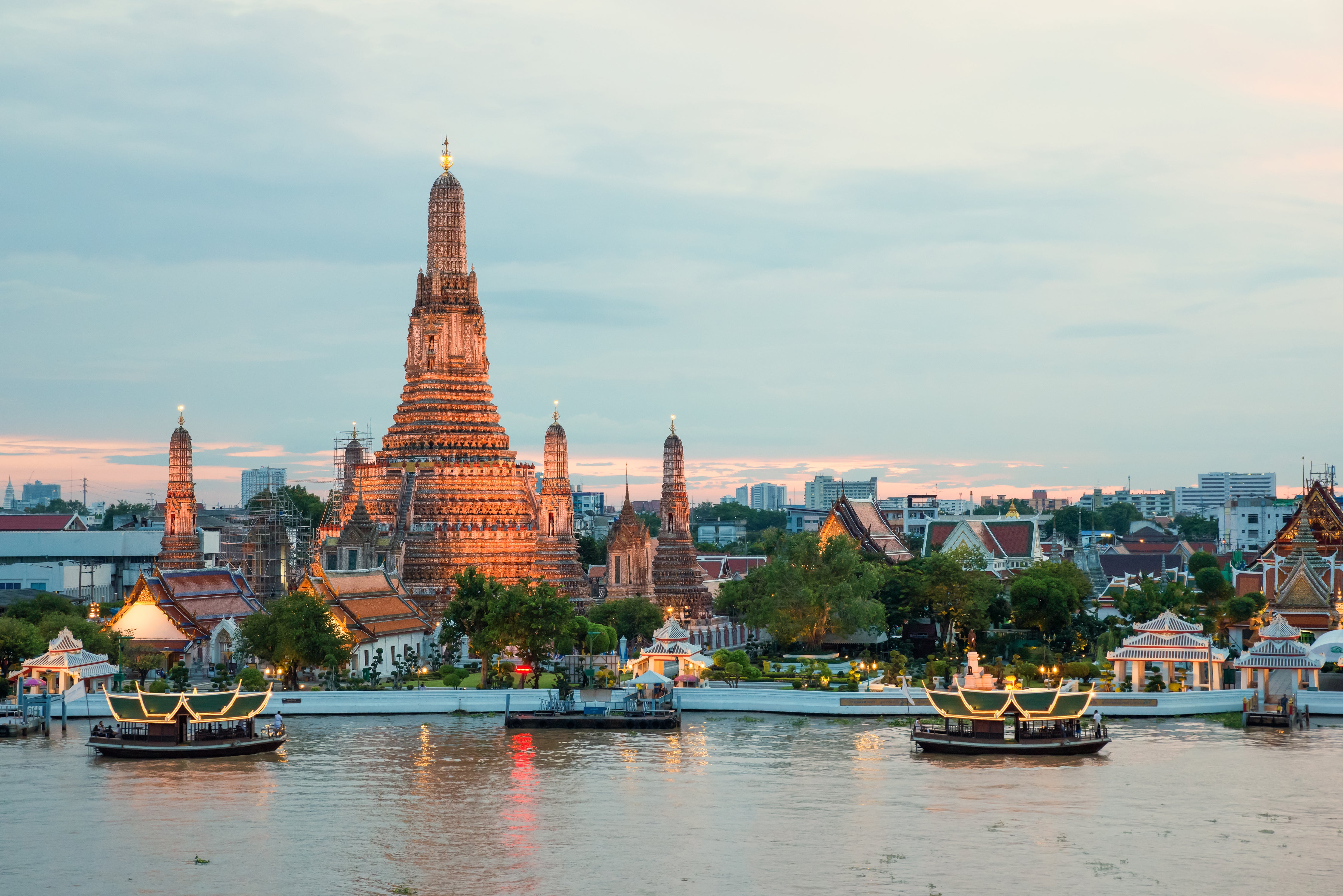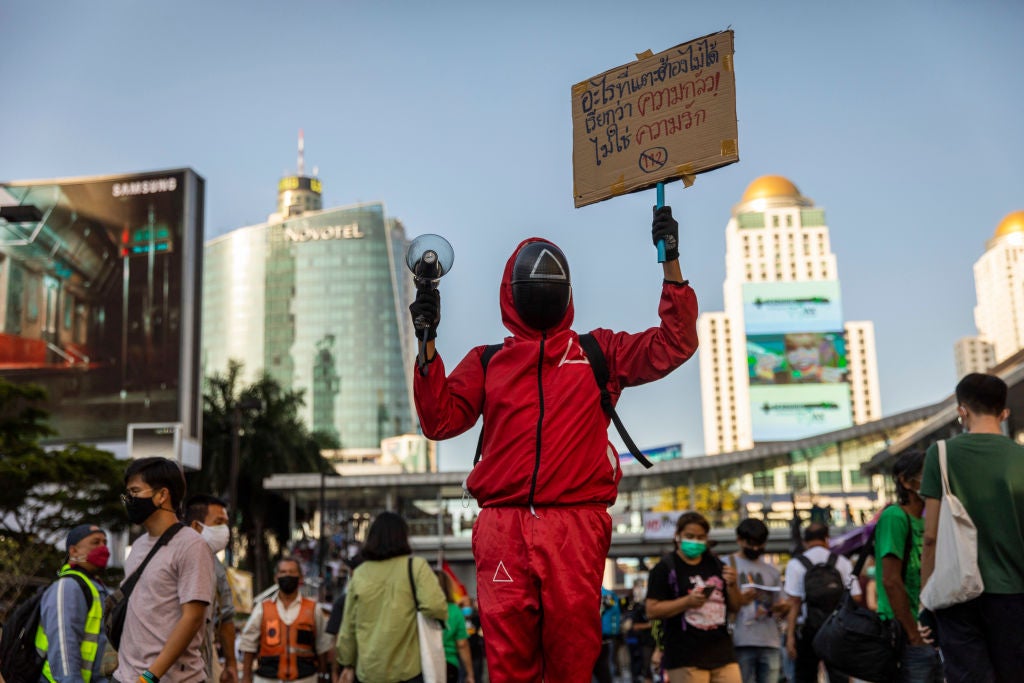The Independent's journalism is supported by our readers. When you purchase through links on our site, we may earn commission.
Some Thai people think there are bigger problems than changing the name of Bangkok
As Thailand faces massive issues with its economy, the government seem more focused on changing the name of the capital city, writes Hannah Beech

Each morning in her market stall in the Bangkok Noi district of the Thai capital, Jintana Rapsomruay, 60, rolls balls of dough into a snack known for its resemblance to the eggs of an oversize lizard. The sweet treat, which looks like a doughnut hole, was supposedly invented by a consort of the first king of the Chakri Dynasty, which continues to reign 240 years later.
The 18th-century monarch liked to nosh on the eggs of water monitor lizards, so the story goes, but the concubine couldn’t get her hands on any, so she substituted dough stuffed with sweet bean paste. The king – among whose accomplishments was moving the Thai capital to its present location – was pleased.
The snack remains popular to this day, but Jintana can barely get by. Like millions of Thais struggling amid the coronavirus pandemic, her income has plummeted by half.
That is why she says she is mystified, and miffed, by all of the time and attention given to the debate in Thailand over whether the capital should be known internationally as “Bangkok” after the old riverside settlement where she lives, or “Krung Thep Maha Nakhon”.
“If I were the government, I would first take care of my people and fix the economy instead of making a fuss over a name for political reasons”, she said. “There are more important things to do.”
The formal name of the capital of Thailand runs 168 letters, so long that it has entered the Guinness World Records: Krung Thep Maha Nakhon Amon Rattanakosin Mahinthara Ayuthaya Mahadilok Phop Noppharat Ratchathani Burirom Udomratchaniwet Mahasathan Amon Piman Awatan Sathit Sakkathattiya Witsanukam Prasit.
None of those 168 Thai letters, it should be noted, spells out “Bangkok”.
The full moniker means City of Angels, Grand City of Immortals, Magnificent City of Nine Jewels (and so on and so on). It is drawn from the holy Pali and Sanskrit languages used in Buddhist and Hindu texts.
In February, the Office of the Royal Society, the official guardian of the Thai language, issued a decision that appeared to underscore its position that the capital should be known everywhere as Krung Thep Maha Nakhon rather than Bangkok.
While a mass protest movement has stalled, discontent with Prayuth’s government simmers. Some critics of the coup that brought him to power fled overseas and turned up dead
The Royal Society’s ruling was subtle, rendering the formal name for international purposes as “Krung Thep Maha Nakhon (Bangkok)” rather than “Krung Thep Maha Nakhon; Bangkok”.
“By using the parentheses, this punctuation mark emphasises the importance of the name in front of the parentheses”, said Santi Phakidkham, the deputy secretary-general of the Office of the Royal Society.
The Thai Cabinet – headed by Prime Minister Prayuth Chan-O-cha, a former military chief and leader of the 2014 coup – approved the Royal Society’s ruling with its own decree, making a parenthetical Bangkok the law of the land.
The shift from semicolon to parentheses has provoked public dissatisfaction. But it’s not the name itself to which anyone really objects; the capital is universally known to Thai speakers as Krung Thep, or, by the initials “Kor Tor Mor”.
Rather, the way an elite clique did the update is what bothered some in a populace that appears increasingly unwilling to accept diktats from royalist, tradition-bound institutions.

“Using Krung Thep over Bangkok is crazy to the point of being idiotic”, said Charnvit Kasetsiri, a Thai historian and former rector of Thammasat University in Bangkok. “The upper-class Thais love to do this kind of thing, changing common names, real Thai names, into these fancy, partly Pali, partly Sanskrit, mixed-up names.”
The government’s push to use what it considers a loftier name for the capital comes amid broader efforts to update international nomenclature, including President Recep Tayyip Erdoğan’s campaign to change Turkey to Türkiye and a push to refer to the capital of Ukraine as Kyiv rather than the Russian Kiev, a changeThe Independent recently adopted.
It also comes amid a global movement to address the legacy of colonialism, including in place names.
But Thailand is the only country in Southeast Asia never to have been colonised, and the name Bangkok is not a relic of empire.
At a time when so many in Thailand are suffering from the economic fallout of the coronavirus pandemic, some Thais are wondering whether an official policy of Krung Thep Maha Nakhon (Bangkok) is really among the most pressing issues for the government.

“I don’t want to say more about the capital name because I don’t have good connections”, Jintana said, her fingers rolling dough. “But what I know is that all these people, they don’t even see vendors like me as human.”
While a mass protest movement has stalled, discontent with Prayuth’s government simmers. Some critics of the coup that brought him to power fled overseas and turned up dead. Dozens of young protest leaders have been imprisoned.
Prosecutions of royal defamation have increased sharply, with a former civil servant sentenced last year to more than four decades in prison. Some protest leaders have called for the monarchy to submit to the constitution and are now facing, collectively, hundreds of years in prison for lèse-majesté, which criminalises criticism of senior members of the royal family.
“People across Thailand, not just the young, recognise the argument of reforming the monarchy”, said Netiwit Chotiphatphaisal, who was elected president of the Student Union at Chulalongkorn University in Bangkok. “It’s not marginal, it’s mainstream.”

Netiwit lost his position in February after the school administration determined that he was connected to an event involving activists who have called for monarchical reform.
Some Thais are more enthusiastic about the government espousing the longer name.
On a recent morning, Vichian Bunthawi, 88, a retired palace guard, sat cross-legged on a bench at the sleepy railway station in Bangkok Noi. The capital should be known around the world as Krung Thep Maha Nakhon, he said, remembering how his primary schoolteacher would write the full name on the chalkboard.
“Krung Thep Maha Nakhon is the name of the capital,” he said. “It is where the king lives.”
Whether as Krung Thep Maha Nakhon or Bangkok, the character of the capital has changed drastically over the decades. City planners filled in the canals that used to be the city’s transportation arteries. Rice paddies gave way to malls and condominiums.
In a back alley behind a Buddhist temple in Bangkok Noi, Chana Ratsami still plays a Thai xylophone. His wife’s family of palace attendants lived in Bangkok Noi for generations.
Now, he said, the lane’s residents are mostly migrants from upcountry.
“They don’t know the history of this place”, he said, describing how the traffic-choked road at the end of the lane used to be a canal with boats floating past, filled with flowers and fruit. “I miss the old city, no matter what it’s called.”
This article originally appeared in The New York Times.
Join our commenting forum
Join thought-provoking conversations, follow other Independent readers and see their replies
Comments
Bookmark popover
Removed from bookmarks